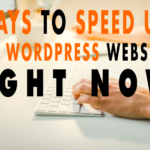5 Ways to Speed Up Your WordPress Website Right Now
- Hosting 01:03
- Cache Solution 01:46
- Image Optimization 03:51
- Plugins 05:33
- Database Optimisation 07:42
- Bonus – Content Delivery Network 08:46
This episode was taken from Tim’s guide on How to Speed Up Your Divi website. We recommend checking out the blog post and video for a more in depth look at the above steps and why they’re important for a fast loading website!
Read the full episode transcript below:
00:25 David Blackmon: Hey everybody welcome to another episode of WP The Podcast I’m David Blackmon
00:33 Tim Strifler: And I’m Tim Strifler
00:35 David Blackmon: And today in episode 614 we’re going to talk about five ways to speed up your WordPress website right now.
boom do these things you’re gonna have the fastest wordpress website in the world i’m just kidding don’t take me literally but it’s a good topic to cover
00:51 Tim Strifler: Yeah and to be clear this isn’t absolutely everything that you can do to make your website faster but these are the five things that you want to start with because these will make the biggest difference.
01:03 David Blackmon: Number one on our list and probably one of the most important if not the most important one is good hosting. Hosting matters folks Tim and I have been preaching this from the rooftop for years. If you’re serious about your business you need to be serious about your hosting. Hosting is the foundation of everything and guess what, not all hosts are created equal. they’re just not you know Bluehost Hostgator they’re cheap they’re going to save you some money but you’re going to be on there with everybody and their grandma sucking up resources and no matter how much you optimize your website if you’re on their shared hosting plans you’re probably not going to be that fast.
01:46 Tim Strifler: Yeah that is 100 true and it all kind of starts from there you want good reliable hosting because if you do all the other things we talk about it will help even on bad hosting but it won’t be as reliable or consistent, and so tomorrow’s episode we’re going to talk about shared hosting versus vps and dedicated. We’re going to talk about why cheap shared hosting is is not good and so tune in tomorrow for that, but the next thing on our list is have a solid cache solution. So wordpress is a database driven cms which means it uses mysql databases to store content and so every time you load a new page on the site it’s going to the database to make sure it has the most recent and updated version of the post and so or if you you’re on like an archive page and you’re pulling in blog posts it’s going to go and make sure you have all the most recent of all the different post types and everything. So there’s a lot that happens behind the scenes that can make a wordpress website very slow out of the box but if you use a cache plug and what it does is it essentially takes a picture of your website a static version instead of the dynamic version and it will serve that version to the user instead and so for a normal website like a brochure style website when you have a lot of content that’s not really changing a lot. It works out really well and like 99 of your website can be cachable and it makes your website drastically faster and so there’s a lot of really really great cache plugins out there if you’re using divi you definitely want to check out divi rocket it’s by my good friend David here and his team. Divi Rocket is made for Divi which means it does some stuff behind the scenes specifically to cater to the way that divi stores content and styling and stuff like that so divi rocket over at divi.space some other good ones out there WP Rocket um w3 total cash there’s a lot I mean I think WP fastest cash there’s so many different ones out there but if you’re using divi definitely look at Divi Rocket because it’s made specifically for Divi.
03:51 David Blackmon: Number three on our list is image optimization. Image optimization is very important one of the main causes that can slow any website down is large images. I remember when i was brand new building websites i would take a picture of of something that i wanted you know and i’d loaded on the website and it was six thousand by three and it was several megabytes. 20 megabytes in size if you don’t know what i’m talking about you’ll realize how big that image is you want your your images to be around the 50 to 75 kilobyte size and i was loading up 20 megabyte images and i had multiple because of course it was in my gallery you know and i wanted it to look good. So your images can look good and look great on normal sizes designed for the website and stuff so remember to optimize your images. You can use Photoshop they’ve got some really awesome tools in here that are going to allow you to optimize the images for the web they’re going to allow you to you know. If you have multiple images you can bulk at it and stuff that’s that i used to do years ago whenever I did image optimization. There’s probably even quicker and better tools today that you can use just google image optimization website WordPress and you’re probably going to come up with a ton of them plus all of the plugins that do on page you know on website image optimization like smush and our good friends wpmu dev have a fantastic plugin that does that we have a free one in the repository and i can’t even remember the damn name of it right now Tim.
05:32 Tim Strifler: yeah i don’t know
05:33 David Blackmon: while you’re on number two i’m going to go ahead and i’m going to search it. yeah squish it’s squishy. i’m gonna go look now i mean i don’t want to be lying
05:43 Tim Strifler: yeah no WP Smush pro by WPmu dev is a great plugin because it’s a set and forget type of thing and so i still recommend as david mentioned using photoshop and resizing and compressing that way but you put wp smush pro on your website it uses the wpmu dev servers to do the image compression and it’ll even resize it too so if you have it a 5000 pixel wide photo and you forgot to resize it before uploading it’ll actually not just compress it from a like a lossless uh standpoint but it will also resize to be whatever you specify to be your max width and height which is really helpful
06:21 David Blackmon: Squished WP squish is our own plug-in we acquired potent plug-ins a couple years ago and this was a plug-in from our lead back-end developer Jonathan and it is legit it’s 100 percent free. Go check it out it does a lot of stuff that a lot of the other image compression. You know um plugins do and guess what it cost you zippo. Zero dollars go download it and WordPress repository
06:49 Tim Strifler: That’s awesome yeah i’m gonna have to try that uh the next one on our list uh the was that the fourth way to speed up your website right now is to use only good plugins so go do a plug and audit and look at plugins that might be slowing down your website. In another episode we’ll talk about how to actually do that but you want to only use good solid plugins that are well coded as well as custom code so it doesn’t matter if it’s in plugin form or if it’s custom code you’ve added to your child theme. If it’s not written well it can slow down your site if it’s super javascript heavy and it’s pulling in all these external resources it can really really slow down your site too and so you have to look at that. A good cache plug-in can help circumvent some of that but if you have a plug-in that’s conflicting with another plug-in it can really slow things down even on the server side too. So that’s something that you really want to look out for.
07:42 David Blackmon: Number five and our final five ways to speed up your WordPress website right now is database optimization. Tim normally takes the tech topics but we have a bonus in there and it’s another tech topic so i’m gonna i’ll let him clean up whatever i’m going to say about the database optimization. if he feels the need to but like Tim said and we described earlier in this episode on the cache part of it. WordPress is made up of databases and Mysql databases well those databases can get cluttered and they can actually grow in size. Trust me I know we’ve had our website grow in size massively through the database and stuff and we have to periodically go in and clean up those database tables and stuff so that our website remains fast and it stays that way there are plugins that are going to do this for you. If you’re versed with WordPress databases and stuff you can clean them pretty easily but database optimization is one of the is our fifth way to speed up your wordpress website.
08:46 Tim Strifler: And uh the bonus way to speed up your website is to use a cdn uh it’s an acronym for content delivery network and the reason why this is a bonus reason is it’s probably not something that you need on every website, but if you have an online business or you have a blog and you want people from all over your country or all over the world to be able to view your content, then a cdn might be a good choice because what it does is a cdn network is a network of servers and it will offload different parts of your website such as the images such as your style sheets and javascript files and it will load those heavy parts of your website. From those servers based off of whatever one is is closest
to the user and so uh those things like images and and big style sheets and stuff like that. Typically is what takes a long time to load and so by having the cdn network use a server that’s closer to the user and load those parts of your website from there it actually speeds up that the time that it takes to get to the user and load the site. So it’s pretty technical but you can check out max cdn. Cloudflare is another form of a cdn and there’s some other ones out there but a cdn can be a great way particularly if you have an online business and you want people from all over the world viewing your your website. If you’re looking to speed up Divi specifically, I wrote an in-depth tutorial at Divi Life that is all about speeding up Divi.
10:08 David Blackmon: Awesome well that was five ways to speed up your words press website right now. Tomorrow we’ve got another great topic as we mentioned shared hosting versus vps versus dedicated. Vps meaning virtual private server and we’re going to kind of walk in you know to what each one of those are the pros and the cons of each and which one you may want to choose for your business and stuff. So Tim until tomorrow we’ll see you then.
10:35 Tim Strifler: Take care, Bye Bye.

Did you Enjoy this Episode?
- Will you consider sharing it online? Just click one of the share buttons below!
- Will you leave us a review? 🙂
- Have a question, or a topic request? Let us know in the comments below!
Want to Connect with David & Tim?
- David:
- Tim:








